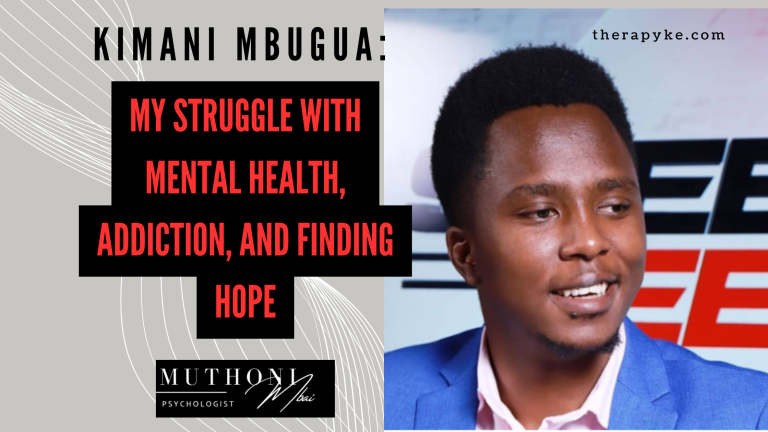
How to Help Someone with Depression

Depression is a silent but heavy burden that affects not just the person experiencing it but also their loved ones. Whether you’re supporting someone in denial, refusing treatment, or struggling with depression yourself, the journey can feel overwhelming. At Therapyke.com, we understand the complexities of caregiving and mental health challenges. Whether you’re seeking help for yourself or someone else, we offer 100% support and guidance to help you navigate these difficult times.
Here are six effective ways to help someone with depression:
Create a Safe Environment for Open Communication:
Let them know they can talk to you without fear of judgment or criticism. Use phrases like, “I’m here for you no matter what,” to encourage them to open up when they’re ready.
Avoid Minimizing Their Feelings:
Avoid saying things like, “Just snap out of it” or “You’re overthinking it.” “Just change how you’re thinking” Instead, validate their emotions by acknowledging their struggles, saying things like, “That sounds really tough.”
Gently Share Information About Depression:
Provide reliable information about depression, its symptoms, and treatment options. This can help them better understand what they’re experiencing and reduce feelings of isolation or fear.
Encourage Small, Manageable Actions:
Depression can make even the simplest tasks feel overwhelming. Suggest starting with small, achievable actions like taking a short walk, drinking water, or getting out of bed.
Offer Practical Support:
Help with day-to-day responsibilities like cooking, running errands, or attending appointments. This can alleviate their stress and show that you care.
Be Patient and Consistent:
Change won’t happen overnight, and they may resist help at first. Continue checking in with them regularly, even if they don’t seem responsive, to show your unwavering support.
How to Help Someone with Depression Who Doesn’t Want Help
One of the most challenging situations is watching someone you care about struggle with depression but refuse help. Denial is common due to the stigma surrounding mental health or the overwhelming feelings depression brings. Here’s how you can make a difference without pushing too hard:
- Be Patient and Non-Judgmental: Show empathy and understanding. Let them know you’re there for them, without pressuring them to accept help immediately. A simple “I’m here if you need me” can go a long way.
- Educate Yourself: Understanding depression can help you approach them with compassion. Learn about symptoms, triggers, and treatments so you can gently address their concerns when they’re ready to talk. Educating yourself will also help you understand why a person suffering depression might be declining help.
- Encourage Small Steps: Suggest low-pressure activities like a walk, a meal together, or watching a movie. These small gestures can help them feel connected and less isolated.
- Respect Their Boundaries: While it’s painful to see someone refuse help, pushing too hard can create resistance. Focus on building trust and gently opening the door to support.
Need to learn more about depression as an individual, a family or a group? Contact us through our Contact Page
How to Help Someone with Depression When You Have Depression
Supporting someone with depression while battling your own can feel like an uphill battle. It’s crucial to acknowledge your limits and prioritize self-care to avoid burnout or worsening your condition. Here are a few ways in which you can help someone with depression when you have depression;
Set Realistic Boundaries: It’s okay to admit that you can’t be everything for everyone. Be clear about what you can and cannot do. For example, you might say, “I want to support you, but I also need time to take care of myself.”
Seek Professional Help for Yourself: Therapy can be a lifeline for caregivers dealing with their own mental health struggles.
Practice Self-Care: Incorporate activities that nourish your mental and physical health, such as meditation, exercise, or hobbies. Remember, self-care isn’t selfish—it’s necessary.
Build a Support System: Reach out to friends, family, or support groups who can help lighten the load. You’re not alone, and leaning on others can make a world of difference.
Our Facebook page is a resource hub filled with stories of hope, practical tips and caregiver resources to help you along the way. Remember, taking care of someone with depression doesn’t mean sacrificing your well-being—you can’t pour from an empty cup.
How to Help Someone with Depression Who Refuses Treatment
Refusing treatment is common, especially if the person feels hopeless or fears being judged. Here’s how you can navigate this delicate situation:
Start with Open Conversations: Ask open-ended questions like, “What worries you about getting help?” or “What do you think might make things better?” Listening without judgment can help them feel heard.
Share Stories of Hope: Sometimes, hearing about others who have benefited from therapy or treatment can make a difference. Emphasize that seeking help isn’t a sign of weakness but of courage.
Highlight Small Wins: If they’re hesitant about therapy, suggest starting with something less intimidating, like online resources, self-help books, or joining a support group.
Be Persistent Yet Gentle: Continue offering support and encouragement over time. Depression often clouds judgment, but consistent care can eventually break through the resistance.
How to Help Someone with Depression Who Doesn’t Want to Talk
When someone withdraws completely, it’s easy to feel shut out and powerless. However, silence doesn’t mean you can’t help. There is something you can do;
Show You’re Present: Actions often speak louder than words. Cook their favorite meal, sit with them in silence, or send a thoughtful text. These gestures show you care without demanding interaction.
Be Patient: Don’t take their silence personally. Depression can make it hard for someone to open up, even with people they trust.
Offer Alternatives: Suggest non-verbal ways to express themselves, like journaling or drawing. You can also let them know they can text or email you if talking feels too hard.
Encourage Professional Support: Gently remind them that therapists are trained to help, even when words are hard to find. A therapist provides a compassionate space where they can feel safe to express themselves in their own time.
The Importance of Caregiver Self-Care: As a therapist, I’ve seen many caregivers fall into depression while trying to support someone else. Caring for a loved one is noble, but neglecting your own well-being can lead to emotional and physical exhaustion.
Acknowledge Your Feelings: It’s okay to feel frustrated, sad, or overwhelmed. Recognizing these emotions is the first step toward managing them. Do not feel guilty for feeling tired, overwhelmed or taking a break. Taking a break allows you to recharge. Even a short walk, a coffee break, or a few minutes of mindfulness can help you reset.
Seek Support: Therapy isn’t just for the person with depression—it’s for caregivers too. Therapy supports you in finding balance and resilience.
Celebrate Small Wins: Focus on the progress, no matter how small. Whether it’s getting your loved one to smile or helping them out of bed, these moments matter.
Do you know someone who may be suffering from depression but is reluctant to seek help? Encourage them to reach out—depression often clouds judgment.
You’re Not Alone—We’re Here to Help
Supporting someone with depression is a journey that requires patience, empathy, and strength. Whether you’re a caregiver or battling your own mental health challenges, you don’t have to do it alone.
Remember, taking care of yourself isn’t just important—it’s essential. When you’re at your best, you can provide the care and support your loved one needs.




[…] how you can help them? Or are they resisting treatment? There is something you can do. Check out this article to learn practical ways to support them, encourage treatment, and take care of yourself in the […]